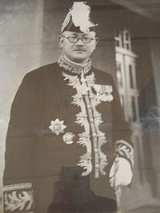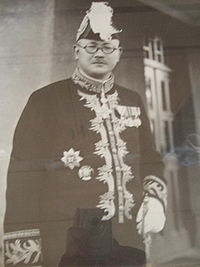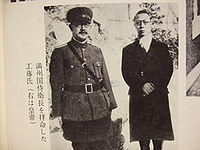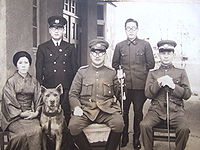
Chu Kudo
Encyclopedia

Japan
Japan is an island nation in East Asia. Located in the Pacific Ocean, it lies to the east of the Sea of Japan, China, North Korea, South Korea and Russia, stretching from the Sea of Okhotsk in the north to the East China Sea and Taiwan in the south...
ese adventurer, Manchukuo
Manchukuo
Manchukuo or Manshū-koku was a puppet state in Manchuria and eastern Inner Mongolia, governed under a form of constitutional monarchy. The region was the historical homeland of the Manchus, who founded the Qing Empire in China...
politician
Politician
A politician, political leader, or political figure is an individual who is involved in influencing public policy and decision making...
and Lieutenant General
Lieutenant General
Lieutenant General is a military rank used in many countries. The rank traces its origins to the Middle Ages where the title of Lieutenant General was held by the second in command on the battlefield, who was normally subordinate to a Captain General....
in the Manchukuo Imperial Army
Manchukuo Imperial Army
The Manchukuo Imperial Army was the armed force of the Japanese dominated puppet state of Manchukuo, serving as the land forces, along with the Manchukuo Imperial Guards...
.
Background
Kudō was born in ItayanagiItayanagi, Aomori
is a town located in the Kitatsugaru District of northeastern Aomori Prefecture in the Tōhoku region of Japan. As of 2009, the town had an estimated population of 15,404 and a density of 368 persons per km². Its total area was 41.81 km².-Geography:...
, Kitatsugaru
Kitatsugaru District, Aomori
is a district located in Aomori Prefecture, Japan.As of 2003, the district has an estimated population of 59,751 and a density of 110.21 persons per km²...
, Aomori
Aomori Prefecture
is a prefecture of Japan located in the Tōhoku Region. The capital is the city of Aomori.- History :Until the Meiji Restoration, the area of Aomori prefecture was known as Mutsu Province....
as the third son of the wealthy farmer Bun'emon Obata. He had an interest in continental issues, and after graduating from Kinjō Gakuen High School left Japan. After dropping out of a vocational school
Vocational school
A vocational school , providing vocational education, is a school in which students are taught the skills needed to perform a particular job...
in 1903, he threw himself into revolutionary movement
Revolutionary movement
Revolutionary movement is a specific type of social movement dedicated to carrying out a revolution. Charles Tilly defines it as a social movement advancing exclusive competing claims to control of the state, or some segment of it. An example of a revolutionary movement is the Armenian...
s occurring in China
China
Chinese civilization may refer to:* China for more general discussion of the country.* Chinese culture* Greater China, the transnational community of ethnic Chinese.* History of China* Sinosphere, the area historically affected by Chinese culture...
. In his autobiographies, he gave many fanciful accounts of his early life in China, including episodes where he claimed to have walked across the frozen Strait of Tartary
Strait of Tartary
Strait of Tartary is a strait in the Pacific Ocean dividing the Russian island of Sakhalin from mainland Asia , connecting the Sea of Okhotsk on the north with...
in order to join bandits in northern China and to attempt to blow up a warlord
Warlord
A warlord is a person with power who has both military and civil control over a subnational area due to armed forces loyal to the warlord and not to a central authority. The term can also mean one who espouses the ideal that war is necessary, and has the means and authority to engage in war...
operated railway.
Even though he did not have any official military standing, through his contacts with Japanese spymaster Kenji Doihara
Kenji Doihara
was a general in the Imperial Japanese Army in World War II. He was instrumental in the Japanese invasion of Manchuria for which he earned fame taking the nickname 'Lawrence of Manchuria', a reference to the Lawrence of Arabia....
and Yoshiko Kawashima he entered the Manchukuo Imperial Army
Manchukuo Imperial Army
The Manchukuo Imperial Army was the armed force of the Japanese dominated puppet state of Manchukuo, serving as the land forces, along with the Manchukuo Imperial Guards...
as a Lieutenant General
Lieutenant General
Lieutenant General is a military rank used in many countries. The rank traces its origins to the Middle Ages where the title of Lieutenant General was held by the second in command on the battlefield, who was normally subordinate to a Captain General....
in 1932 and simultaneously served as both Chamberlain
Chamberlain (office)
A chamberlain is an officer in charge of managing a household. In many countries there are ceremonial posts associated with the household of the sovereign....
and Aide-de-camp
Aide-de-camp
An aide-de-camp is a personal assistant, secretary, or adjutant to a person of high rank, usually a senior military officer or a head of state...
to the Emperor of Manchukuo. Feeling that a Chinese name would be more appropriate for work in China, Tetsusaburō Kudō consulted with the Manchurian emperor Puyi
Puyi
Puyi , of the Manchu Aisin Gioro clan, was the last Emperor of China, and the twelfth and final ruler of the Qing Dynasty. He ruled as the Xuantong Emperor from 1908 until his abdication on 12 February 1912. From 1 to 12 July 1917 he was briefly restored to the throne as a nominal emperor by the...
and received the name .
Always willing to help others from Aomori, his home in Xinjing (present day Changchun
Changchun
Changchun is the capital and largest city of Jilin province, located in the northeast of the People's Republic of China, in the center of the Songliao Plain. It is administered as a sub-provincial city with a population of 7,677,089 at the 2010 census under its jurisdiction, including counties and...
) was known as a "rōnin
Ronin
A or rounin was a Bushi with no lord or master during the feudal period of Japan. A samurai became masterless from the death or fall of his master, or after the loss of his master's favor or privilege....
house". In 1942, he held secret meetings with Fumimaro Konoe
Fumimaro Konoe
Prince was a politician in the Empire of Japan who served as the 34th, 38th and 39th Prime Minister of Japan and founder/leader of the Taisei Yokusankai.- Early life :...
and others in the upper levels of the Japanese government who hoped to bring a quick end to the Second Sino-Japanese War
Second Sino-Japanese War
The Second Sino-Japanese War was a military conflict fought primarily between the Republic of China and the Empire of Japan. From 1937 to 1941, China fought Japan with some economic help from Germany , the Soviet Union and the United States...
and an armistice with Kuomintang
Kuomintang
The Kuomintang of China , sometimes romanized as Guomindang via the Pinyin transcription system or GMD for short, and translated as the Chinese Nationalist Party is a founding and ruling political party of the Republic of China . Its guiding ideology is the Three Principles of the People, espoused...
.

Puppet ruler
A puppet ruler is a person who has a title indicating possession of political power, but who, in reality, is controlled by outside individuals or forces. Such outside power can be exercised by a foreign government, in which case the puppet ruler's domain is called a puppet state...
of the Japanese Kwantung Army. However, the emperor highly trusted Kudō, and in his memoirs "The First Half of My Life" (我的前半生) wrote: "He would always speak at my side. He even expressed to me secret discontent with the Kwantung Army. One time when the color of my tea seemed odd, I was about to have it tested thinking that someone had poisoned it. Kudō took the tea cup and drank it all at once. After I had become emperor, he was the only Japanese to call me 'His Majesty the Emperor', and when he was displeased with the tyrannical Kwantung Army, he told me that he believed that I could restore the name of the Qing dynasty. The loyalty that he displayed would certainly not have paled even to the most model retainers, so gave him the name Chū [Loyal] and treated him like family. He wept with great emotion, and swore to always be loyal until his death."

Additional References (Japanese)
- Akinaga, Yoshirō, Kuroi Rakujitsu. 1965.
- Kudō, Chū, Kōtei Fugi Watashi wa Nihon o Uragitta ka. 1952.
- Kudō, Chū, Kōtei Fugi wa Nani o Kangaeteita ka. 1956.
- Kudō, Tetsuo, Kudō Chū no Shōgai Tairiku ni Inochi o Kaketa Otoko, 1990.

